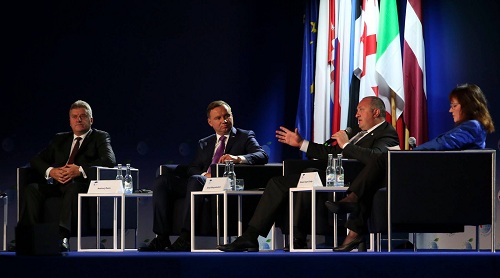President Margvelashvili: Georgia’s EU Membership ‘Beneficial’ for Russia

Giorgi Margvelashvili together with Macedonian and Polish Presidents, September 5, 2017. Photo: president.gov.ge
Georgia’s membership to the European Union “would only be beneficial for Russia,” President Giorgi Margvelashvili said at the Economic Forum in Krynica Zdrój in southern Poland on September 5.
Sitting on the “Unfinished Integration and the Aspirations of European Countries” panel alongside Presidents of Poland and Macedonia, Andrzej Duda and Gjorge Ivanov, respectively, President Margvelashvili spoke on Georgia’s European aspirations and its relations with the Russian Federation.
Answering the moderator’s question on whether Georgia feels pressured by Moscow for its European aspirations, President Margvelashvili stated that the country has been “severely punished through occupation” of two of its regions, “through the fact that we have 15% of our population internally displaced,” because of the decision to pursue “free choice” in its external relations.
Margvelashvili also rejected the idea that “the Georgian-Russian tension” emerged in 2008, “when Russia, through its army, occupied parts of Georgia,” as well as the “tendency to link this to Georgia’s aspirations to NATO,” saying Moscow has been conducting hybrid warfare against Georgia since the country restored its independence in early 1990s.
“The reality is that, Russia, through hybrid war, something that you are experiencing in Ukraine [now], has been doing this since the beginning of 1990s, after Georgia, splitting from the Soviet Union, declared that it was coming back to its identify of being a European state,” he said.
President Margvelashvili spoke on the future of Georgia-Russia relations as well, saying that the Russian Federation needs to rethink “the paradigm of privileged interest zones” and “come to a rational discussion” with Georgia.
“If we look at the Georgian-Russian relations from the perspective of a rational, stable and common sense prism, then we would say that it would be only beneficial for Russia to have Georgia as a member of the European Union, because in that case Georgia would be more stable and economically stronger. It could suggest more partnerships to Russia on economic and other issues,” Margvelashvili noted.
The President added that it should also be the goal of the European countries “to bring Russia to a rational political dialogue where you [will] discuss not the myths, emotions, sentiments and nostalgies, but real solutions for our peoples, and for their better life.”
“Eventually, we have to come to a more civilized form of relationships, where we talk not from the perspectives of punishment, of nostalgy, but from the perspective of discussing what could be a better solution for Georgian citizens, for Russian citizens, for Ukrainian citizens,” he also noted.
"Georgia’s #European integration is a historical objective of the Georgian society" – #EconomicForum #Krynica pic.twitter.com/NSmhRBDVjT
— President Of Georgia (@MargvelashviliG) September 5, 2017
Polish President Andrzej Duda, who also spoke at the panel, said that Poland has always been “a country that supports the European ambitions of states which are not yet members of the EU but are striving to join the bloc in the future.”
Krzysztof Szczerski, Duda’s chief aide, said on September 4 that at the Forum the Polish president would underline the country’s support for a further enlargement of the European Union.
“Today, the Enlargement Policy, which used to be among the key initiatives, is somewhat pushed to the margins of European policy,” the aide stressed, expressing hope that that the opening panel with the three Presidents and the Forum in general would “highlight Polish support for a further enlargement of the EU.”
On the sidelines of the economic forum, President Giorgi Margvelashvili held a face-to-face meeting with Andrzej Duda, where the sides spoke on the relations between the two countries and Warsaw’s support to Georgia’s European and NATO integration.
This post is also available in: ქართული (Georgian) Русский (Russian)